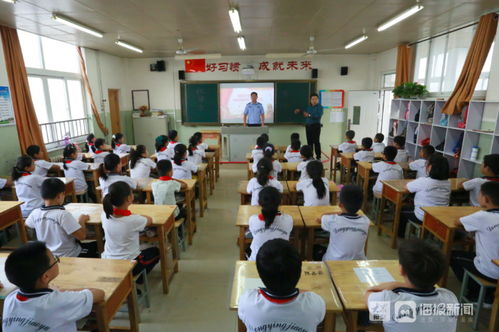您所在的位置:首页 - 科普 - 正文科普
早教内容包括哪些
![]() 金嫣
2024-05-20
【科普】
1119人已围观
金嫣
2024-05-20
【科普】
1119人已围观
摘要**Title:EnhancingSocialSkillsinEarlyChildhoodEducation**Intherealmofearlychildhoodeducation,fosterin
Title: Enhancing Social Skills in Early Childhood Education
In the realm of early childhood education, fostering social skills lays a crucial foundation for a child's holistic development. Social interactions at a young age not only shape a child's personality but also significantly impact their future relationships and success in various spheres of life. Let's delve into the importance of social skills in early education and explore effective strategies to enhance them.
Understanding the Importance of Social Skills Development
1. Building Blocks of Social Competence
Social skills encompass a range of abilities, including communication, cooperation, empathy, and conflict resolution. These skills enable children to navigate social situations effectively, form meaningful relationships, and thrive in diverse environments.
2. Impact on Academic and Life Success
Research indicates a strong correlation between early social competence and academic achievement, as well as longterm socioemotional wellbeing. Children with welldeveloped social skills tend to perform better academically, exhibit higher selfesteem, and engage in healthier behaviors.
Effective Strategies for Promoting Social Skills in Early Education
1. Structured Social Activities

Introduce structured activities such as group games, collaborative projects, and roleplaying exercises. These activities provide opportunities for children to practice turntaking, sharing, and teamwork while having fun.
2. Emotion Recognition and Regulation
Incorporate activities that help children recognize and express emotions, such as storytelling with diverse characters or using emotion cards to identify feelings. Teach simple strategies like deep breathing or counting to manage strong emotions.
3. Positive Reinforcement and Modeling
Offer praise and encouragement when children exhibit desired social behaviors, such as sharing toys or comforting a friend. Additionally, educators should model prosocial behaviors through their own interactions and communication with students.
4. Structured Peer Interactions
Facilitate structured peer interactions through activities like buddy reading, cooperative learning tasks, or peer tutoring. Assigning roles and providing clear guidelines can support positive social exchanges and skill development.
5. Conflict Resolution Training
Teach children constructive ways to resolve conflicts, such as using "I" statements to express feelings, listening actively to others, and brainstorming solutions together. Encourage empathy by helping children understand different perspectives.
6. Creating Inclusive Environments
Foster inclusivity by celebrating diversity, promoting respect for differences, and addressing instances of prejudice or exclusion. Create classroom norms that emphasize kindness, empathy, and acceptance of all individuals.
7. Parent and Community Involvement
Collaborate with parents and caregivers to reinforce social skill development at home through consistent routines, positive reinforcement, and modeling respectful communication. Engage community resources such as social skills workshops or family support programs.
Conclusion
In conclusion, early childhood education plays a pivotal role in nurturing social skills essential for lifelong success. By implementing a combination of structured activities, emotional support, positive reinforcement, and inclusive environments, educators can empower young learners to thrive socially and emotionally. Investing in social skills development not only benefits individual children but also contributes to the creation of harmonious and resilient communities. Let's continue to prioritize the cultivation of social competence in our early education programs, laying the groundwork for a brighter and more connected future.
Tags: 魔兽游戏名 斗罗大陆电视剧豆瓣 黑石铸造厂 战国七雄地图
版权声明: 免责声明:本网站部分内容由用户自行上传,若侵犯了您的权益,请联系我们处理,谢谢!联系QQ:2760375052
上一篇: 齐齐哈尔考研班哪个好
下一篇: 继续教育考试题及答案2024
最近发表
- 缅甸多名华人护照被埋,大使馆的回应与我们的思考
- 健身路上的隐形杀手,类固醇增肌的代价
- 柯淳短剧播放量震惊全场,揭秘背后的成功秘诀与未来展望
- 联合国秘书长拒绝了普京的提议,国际合作的挑战与机遇
- 上千位歌迷在场外听刀郎演唱会,音乐无界,情感共鸣的见证
- 张本智和发文祝贺妹妹夺冠,兄妹携手共赴乒乓荣耀之路
- 云南曲靖市会泽县发生4.4级地震,地震应急与科普知识解析
- 拯救山火,韩国消防员盒饭中的米饭与泡菜
- 传奇歌手李国祥离世,音乐界的巨大损失
- 黄金价格的终极目标,探索财富与安全的黄金之路
- 喻恩泰,用眼技征服观众,引发热议的幕后故事
- 中缅合作修复的最高佛塔安然无恙
- 失踪的清华毕业生,罗生门背后的真相
- 救人溺亡外卖员父母70岁,孩子13岁,家庭的无尽哀歌
- 王宝强这段不像演的,从草根到巨星的蜕变之路
- 开放政策为全球经济注入稳定力量
- 防水冲锋衣会致女性不孕?假!
- 蒙牛净利润暴跌98%,挑战与变革之路
- 用户吐槽小米试驾服务,雷军秒道歉,一场危机公关的教科书式操作
- 女孩子名字大全
- 可折叠电动垂直起降飞行器亮相广州,未来出行的革命
- 连接梦想与现实的桥梁
- 商业健康保险药品,倾听业内声音,共筑健康未来
- 温柔的名字
- 50岁陈德容,优雅回应浪姐争议,展现成熟女性的魅力与智慧
- 为您的钱找到合适的安全港
- 甲亢哥学功夫被一棍打出痛苦面具,一场意外的启示
- 你的生活助手——海尔空调遥控器
- 董宇辉报平安,传递正能量,共筑信心桥梁
- 如何挑选适合女孩的英语名字——灵感与选择策略
- 王者荣耀崩了,一场虚拟世界的地震
- 如何为您的咖啡厅取一个吸引人的名字
- 王俊凯这旗一定是非拿不可吗?
- 证监会对浙商证券采取责令改正措施,深度解析与启示
- 阳光保险董事长张维功,构建稳健发展的阳光模式
- 黎巴嫩首都的巨响,一场意外的震撼与反思
- 给宝宝起名的艺术——如何选择最佳的名字
- 美联储再次面临痛苦抉择,如何平衡经济复苏与通胀风险?
- 上海单独二胎新规,如何让家庭更加幸福?
- 王者荣耀回应崩了,一场游戏背后的技术挑战与应对
- 苏宁易购2024全年盈利同比增114.93%,重塑零售格局,引领电商新纪元
- 提升家庭网络体验的魔法——轻松搞定路由器设置,让网速飞起来!
- 东旭集团证券违法拟被罚17亿元,深度解析与启示
- 如何优雅地从保护模式中醒来——手机安全模式解除指南
- 编程世界的魔法之光
- 二手平台现露营装备低价甩卖,是捡漏还是陷阱?
- 让梦想不再遥不可及
- 教师临近退休却遭解聘,教育公平与职业尊严的拷问
- 漂流男孩事件系摆拍?多方回应
- 给女孩起名的艺术,如何用名字塑造未来



